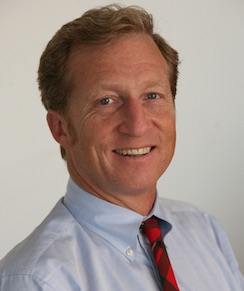By Chris White
Billionaire activist Tom Steyer and his multiple environmental groups might have been more involved in the campaign to take down ExxonMobil than previously thought, according to a leaked memo The Daily Caller News Foundation obtained.

Tom Steyer, an American billionaire hedge fund manager, was the single largest political donor in the 2016 election cycle, contributing more than $91 million to Democrats and liberals.
Fahr LLC, Next Gen America and TomKat Foundation hashed out ways to “weaken the political influence of the oil industry by leveraging the ExxonMobil investigation” during a strategy meeting in November 2015, the memo notes. They also sought to “target Exxon management” and “engage with city attorneys” in California on future campaigns against the Texas-based company.
All three groups were founded by Steyer, who has positioned himself as a stringent opponent of the oil industry.
The memo references a probe former New York Attorney General Eric Schneiderman kickstarted on Nov. 5, 2015 to determine if Exxon lied to the public about the risks climate change pose to investors. Schneiderman, a Democrat, tried to arrange a phone meeting with Steyer four months after the AG announced the climate investigation.
Ted White, a lawyer for Fahr LLC who attended the November 2015 meeting, sent an email to Erin Suhr, director of strategic planning at Fahr LLC, noting “Eric Schneiderman would like to have a call with Tom regarding support for his race for governor . . . regarding Exxon case.”
Steyer, a Democratic financier who is also waging a crusade to get President Donald Trump impeached, has waged his own private crusade in the past against Exxon. NextGen held a rally in April 2016 to push former New Hampshire AG Joseph Foster to take up the anti-Exxon message. The group continued to push and prod the Democrat to pursue Exxon.
NextGen called on Foster “to find the truth about whether Exxon Mobil intentionally misled the public about the risk climate change and fossil fuels pose to our communities,” according to a press statement the group published at the time. Steyer eventually backed away from the probe as the 2016 election neared.
 “We’re definitely not pushing this thing,” Steyer told Politico on Sept.21 2016 when asked about his communications with Schneiderman, who obtained hundreds of thousands of dollars from billionaire liberals as the Exxon investigations took hold. “We are not part of this effort,” Steyer added.
“We’re definitely not pushing this thing,” Steyer told Politico on Sept.21 2016 when asked about his communications with Schneiderman, who obtained hundreds of thousands of dollars from billionaire liberals as the Exxon investigations took hold. “We are not part of this effort,” Steyer added.
An official with NextGen clarified Steyer’s comments, telling Politico a day later that the probe is “not something that Tom personally is pushing, though some of our teams on the ground have participated in rallies or events to support our coalition partners.”
But the November 2015 memo TheDCNF obtained appears to show NextGen, among other groups associated with Steyer, played an important role in brainstorming ways to target Exxon. Their actions went above and beyond organizing rallies with coalition parties.
Two of the people present at the meeting were briefed in November 2015 about aspects of the legal campaign against the oil industry. NextGen Chief Operating Officer Dan Lashof and the group’s attorney, David Weiskopf, received a confidential March 9, 2015 memo outlining the legal strategy, according to media reports.
Cities across the country slowly but surely began pursuing oil companies for their alleged crimes against the environment. Oakland, San Francisco and New York, for instance, have all pursued lawsuits against Exxon, Chevron and others for their contributions to climate change.
San Francisco, for one, announced it would sue oil giants BP, Chevron, ConocoPhillips, Exxon and Shell. The city wants oil companies to pay for infrastructure projects that San Francisco claims it needs to ease the impacts of climate change. City officials announced the lawsuit shortly after Steyer provided a $30,000 donation to a ballot initiative headed by the mayor.
NextGen has not responded to the TheDCNF’s request for comment about the memo or the nature of the meeting.
Steyer has amassed a reputation as a kingmaker in Democratic politics and a bitter enemy of fossil fuels. He spent about $86 million in the 2016 election cycle in a losing bid to get Democrats elected, while Next Gen plowed another $56 million into that year’s election, according to campaign finance data.
NextGen also spent nearly $21 million in the 2014 election cycle, but only had a 38 percent rate of supporting winning candidates, according to the Center for Responsive Politics. Steyer spent more than $73 million of his personal fortune that election cycle, only to see Republicans take control of the Senate.
His overall contributions dwarfed those of fellow billionaire Sheldon Adelson, a conservative who pledged $47 million in donations to Republican candidates in 2016.
Content created by The Daily Caller News Foundation is available without charge to any eligible news publisher that can provide a large audience. For licensing opportunities for this original content, email licensing@dailycallernewsfoundation.org.



California is, year after year, victim to mud slides, earthquakes, wildfires, droughts, floods and Democrats. The cause is weather (and politics). Granted that climate changes, there is no provable way to determine what percentage, if any, of the change is assignable to Exxon/Mobil never mind whether that part of the change is harmful or beneficial. Climate isn’t like derailed tank cars or a marine collision where provable blame can be assigned. There is also a very significant issue regarding how much damage would accrue to California in the absence of the products of Exxon/Mobil, e.g. fuel for electric generation, for transportation, for infrastructure, for farming – I suspect the mitigating factors of oil production outweigh the percentage of climate changes assignable to it. How can a court assign value in so nebulous a case? – In addition, a curious point has occurred to me: I remember the seventies. I remember the impending ice age. I recall some harebrained schemes to ameliorate cooling but I don’t recall any proposals to increase atmospheric carbon dioxide. If it warms the planet (and it is also otherwise beneficial), why was that not a widely proposed solution?